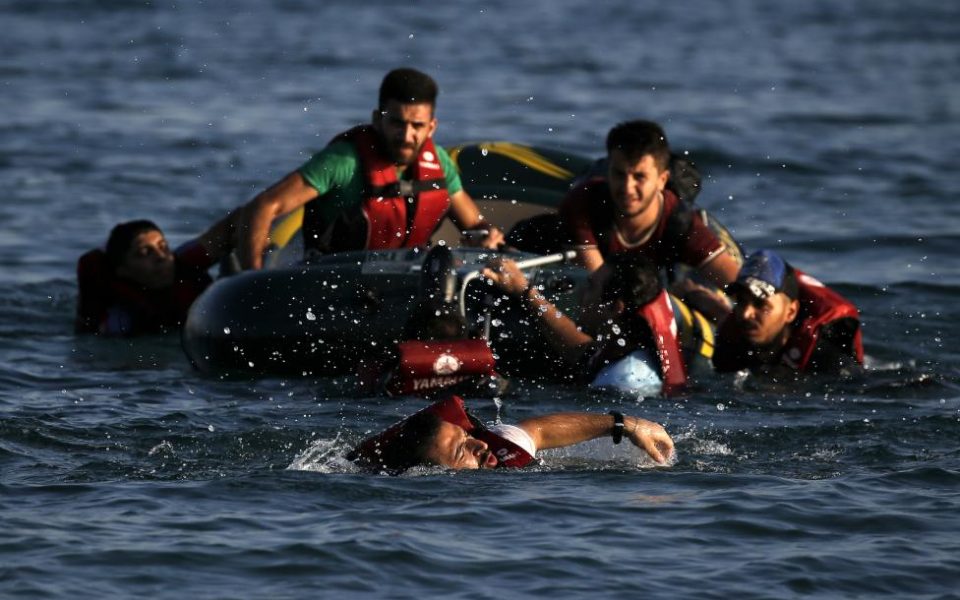Europe still has time to help Greece with its refugee crisis

As Greece ran off the edge of the fiscal cliff this summer another crisis loomed that had been marginalized by the media in favor of Greece’s drama with its creditors.
This was the migrant crisis which has stymied Europe for the past two years and has transformed into a European wide humanitarian crisis that nobody really knows how to deal with.
The numbers are staggering: 124,000 refugees and migrants have arrived in Greece since January, a 750 percent increase from the previous year. Hundreds of millions of euros have been earmarked to help Greece and other EU nations deal with the problem but all the while overburdened boats sink to the depths of the Mediterranean and Aegean taking with them the lives of thousands.
As the numbers ramp up and up, nobody knows what to do. SYRIZA so far has proven incapable of handling this issue and is besieged by crises on two fronts, one economic and one humanitarian. Were it not for volunteer groups and NGO’s doing what they can, the human cost would be exponentially higher.
However, the current Greek government cannot be blamed alone for this mess. As inexperienced as SYRIZA officials are, they are attempting to do what they can and the speed at which the pre-fabricated units were installed to house the new migrants at a reception center in Elaionas, near central Athens, is impressive by Greek standards.
Unfortunately, this has not proved enough and attempting to deal with a broken political base, a third bailout and enraged political opponents have left SYRIZA and its Prime Minister Alexis Tsipras unable to get to grips with the extent of this humanitarian disaster.
The European Union must take some of the blame as well. Perhaps more so than the financial crisis, Europe’s real weaknesses have been revealed in the face of this humanitarian crisis.
Of the 40,000 refugees Europe promised to resettle, only a fraction of those have been dealt with. European member states are dragging their feet in dealing with this issue as the protection offered the central states by the Dublin Accords allows them the luxury of sitting back and letting the periphery deal with the initial onslaught of applicants.
Immigration is always a sticky issue, doubly so when coupled with economic uncertainty. Extremist parties are all too willing to capitalize on disenfranchised voters back home to turn refugees into a scapegoat for the countries ills.
This is the main reason behind Europe’s slow response. European leaders realize this crisis must be dealt with, but they are all too wary of wavering support in their respective countries. They do not want to explain to an electorate that they are bringing in thousands of refugees while extremist parties are nipping at their heels.
So while everyone is calling for a European solution, the inherent self-interest of the member states of the Eurozone is preventing this from happening. As the financial crisis has shown us, Europe works well in the good times but is utterly helpless during the bad ones.
The conundrum facing the refugees is they have nowhere to go and nobody wants them. As they sit in queues in sweltering conditions, tension rises and violence breaks out as has been evidenced on the Greek island of Kos. This in turn creates anger and frustration among both the Greek authorities and the people watching the drama unfold. The violence becomes a self-fulfilling prophecy and sows anger and ill intent among the local populace.
Europe has decided to throw money at the problem but money alone will do nothing to alleviate this crisis. A plan is needed to deal with this issue that must go above and beyond what is currently being implemented.
What’s more, there needs to be a wide program of education for local populaces to teach them about the potential benefits that refugees and migrants can bring to a country. As it stands now, there is no acceptance, only mistrust and until these prejudices are dealt with, migrants will never feel welcome in Europe.
Finally, Europe needs to actively help transport these people to their destination of choice instead of having them languish on a Greek island or in a park in central Athens. By forcing these people to sit in crowded stadiums and squat in tents, Europe is deepening a crisis that is only going to get worse as the situation continues to deteriorate in the Middle East.
It is a particular form of cruelty that Europe is putting the onus on countries like Greece and Italy to deal with the initial onslaught. As it stands now the self-interest of the eurozone member states, the out-dated Dublin accords, and the reluctance to deal with the issue has created a humanitarian crisis with the very real potential for social upheaval.
The time to act is now. Europe may have failed Greece financially, but at the very least it can help the country deal with what the EU Commission has called the “worst refugee crisis since the Second World War.”
* Konstantine Roccas is a graduate at UBC's Graduate School of Journalism in Vancouver, Canada. He writes about European affairs and political economy.




